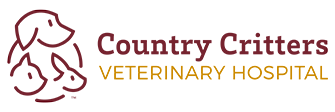Surgery Information
Details of how your pets day will go.
At Country Critters Veterinary Hospital, we do everything we can to minimize the risks involved and keep you informed. We strongly recommend pre-surgical bloodwork prior to all of our surgical procedures. We want to make sure your pet's body can handle not only the stress of surgery but recover safely from anesthesia.
The anesthetic drugs and pain medications we use are excreted from the body by either the liver or kidneys. If either of these organs is compromised, we will modify the drug protocol, and give fluids or additional medications to make anesthesia as safe as possible for your pet. We recommend a send-out panel that gives the doctor basic chemistry, complete blood count, and clotting times to make sure your pet is healthy for surgery.
Two weeks to 3 days before your pet's procedure we schedule an appointment to have your pet's blood drawn prior to anesthesia. This is your opportunity to ask questions, choose your surgery options, and meet with one of our doctors if you are new to our practice.
The next step is choosing extra services. We recommend having an IV catheter placed for your pet's surgery. An IV catheter can make a life-saving difference in the rare event of an emergency. Your pet's catheter would be placed before anesthetic medications are given and stay in until your pet is fully awake and moving around. Our technicians monitor your pet's heart rate, respiratory rate, oxygenation, blood pressure, and gum color both during anesthesia and recovery. Our patients are given pain medications at the time of the procedure and are sent home with pain medication as well.
All our surgery patients must be free of external parasites. If your pet is found to have fleas during the doctor's surgical exam, we will apply flea preventative in-house to protect the other patients. There is an additional charge for this service.
What to expect on your pet's Surgery Day
- We require pre-surgical bloodwork for all patients undergoing surgery. This should have been completed during your pet's pre-anesthetic appointment. All of your additional surgery options should have been discussed at this time as well.
- All patients are scheduled admit times for the morning of their surgery. Mornings are busy for all of us and we appreciate your patience. Please allow adequate time to fill out the required paperwork and for us to address your questions and concerns.
- Your patience is greatly appreciated. Even though you may have an early admit appointment in the morning, their procedure may not take place until later in the afternoon. Occasionally scheduled and/or emergency appointments may affect our day and in turn when our surgeries are finished. Having them here gives us time and flexibility to get their additional pre-surgical monitoring done, place an intravenous catheter if elected, and perform any other pre-surgical procedures or medicating that needs to be done beforehand.
- The doctor will do a thorough physical exam on your pet before administering anesthetics to ensure that a fever or other illness won't cause a problem. We adjust the amount and type of anesthetic used depending on the health of your pet.
- The management of pain in veterinary medicine has advanced greatly over the last few years. The use of preemptive pain medication is far more effective than using the same medication after surgery. Prior to the induction of anesthesia, patients are pre-medicated with anesthetics that act on the central nervous system to block the perception of pain. These anesthetics offer the patient a significant reduction in pain and discomfort when combined with non-steroidal anti-inflammatory medications used during and post-surgery.
- Surgical technicians monitor heart rate, respiratory rate, oxygenation, blood pressure, gum color, and body temperature throughout the procedure and recovery period. Some patients are supported with intravenous catheters and fluids.
- Patients may be discharged after 5:00 PM or stay overnight in the hospital at no charge. Whether they are released from the hospital the same day of surgery or are kept overnight is left to the doctor's discretion and how fast the pet recovers from anesthesia. The surgery technician will call you once your pet is in recovery to discuss the specifics and when they may be picked up. All declaw patients will stay overnight at no charge.
- You will receive personalized discharge instructions for your pet when you pick them up. We will review the written home care instructions at the reception desk.
FAQ's about Surgery
Answers to some of your most common questions:
How do I prepare my pet for Surgery Day?
We require your pet have fasted before surgery. This means withholding food for 12 hours prior to your pet's scheduled procedure. Water is allowed until the morning of the procedure, but no food after 11 pm the night before surgery. The day before the procedure we will call and remind you of your pet's scheduled procedure, preparation instructions and your scheduled admit time.
Will my pet have stitches, staples, or sutures?
For some surgeries, we use absorbable sutures underneath the skin. These will dissolve on their own and do not need to be removed later. Other surgeries, especially tumor removals, do require skin stitches. For most surgeries, these will be removed 10-14 days after the procedure. With either type of suture, you will need to keep an eye on the incision for swelling or discharge, checking it twice a day. Most dogs and cats do not lick excessively or chew at the incision, but this is an occasional problem you will also need to watch for. We have E-Collars available if your pet does chew or lick at their incision. You will also need to limit your pet's activity level and no baths are allowed for the first 14 days after surgery. You will get more detailed instructions on how to care for your pet after surgery with their discharge paperwork.
Will my pet be in pain?
Anything that causes pain in people can be expected to cause pain in animals. Pets may not show the same symptoms of pain as people do; they usually don't whine or cry, but you can be sure they feel it. The pain medications needed will depend on the surgery performed. Major procedures require more pain relief than others. At Country Critter Veterinary Hospital, we provide pain management customized to each patient's specific needs. We strive to have pain-free recoveries for every individual. Injectable pain medications may also be used during surgery as well as oral medications to be administered at home. Providing whatever pain relief is appropriate is a humane and caring thing to do for your pet. We do require pain medications with all of our surgical procedures.
Call us today at (765) 378-7387 for more information on our surgical care services.

